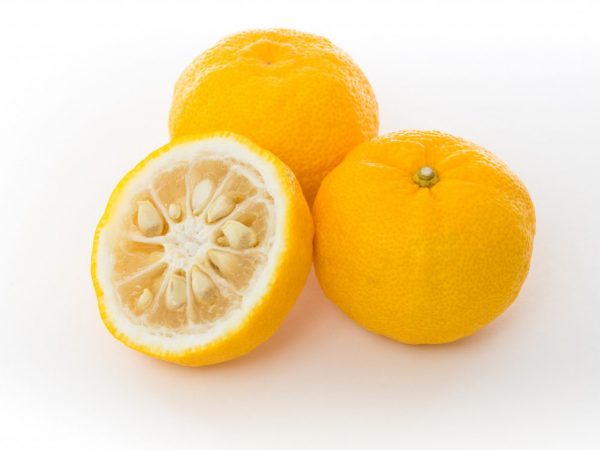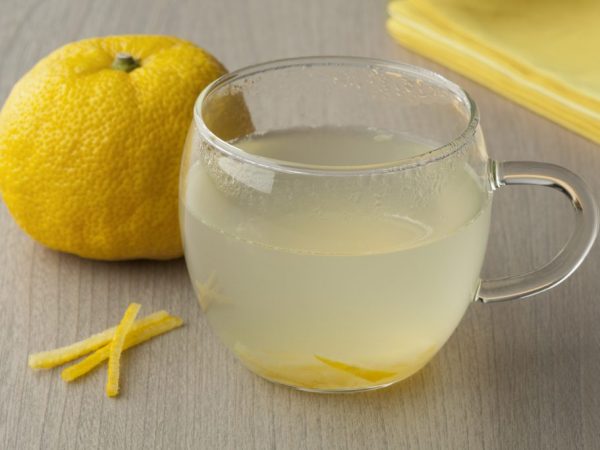Japanese citrus Yuzu
Yuzu citrus is a hybrid fruit native to Japan and China. It has become widespread among the eastern peoples, thanks to its useful chemical composition, taste and medicinal properties.

Japanese citrus Yuzu
Botanical characteristic
Decorative Japanese lemon is a hybrid of mandarin and Ichang papeda. It is an evergreen plant up to 4 m high with branches covered with numerous large thorns. The peel is bumpy, has a thickness of 3.8-3.9 mm. The size of the Yuzu fruit is similar to the size of an average tangerine: up to 7.5 cm in diameter, weighing about 50-55 g. Fully ripe fruits are yellow, the unripe fruit has a dark green peel.
The fruit has a characteristic Citrus aroma with a coniferous undertone and floral notes. The taste is reminiscent of lemon and lime, but an order of magnitude sour.
Citrus Yuzu has another name - Yunos.
In the wild, it grows in Japan, Korea, Tibet and central China.
The plant is frost-resistant, can withstand temperatures as low as -9 ° C. Other varieties of citrus are grafted onto Yuzu, which increases its resistance to low temperatures.
Chemical composition and useful properties
The chemical composition of Yuzu citrus peel includes:
- sucrose, glucose and fructose,
- citric acid
- glycosides,
- fiber
- pectins,
- nitrogenous elements,
- essential oils.
The content of ascorbic acid is about 40 mg per 100 g of the product. There is a significant amount of vitamins B, A, PP, potassium, salts, calcium and phosphorus.
Calorie content - 21 kcal per 100 g of product, including:
- 0.5 g of proteins
- 0.1 g fat
- 7 g of carbohydrates.
Due to its composition, Japanese lemon is useful for:
- strengthening the cardiovascular system,
- increasing immunity against colds,
- maintaining the activity of the nervous system,
- strengthening nails, skeletal system, teeth and hair,
- improving the quality of visual function,
- treatment of rheumatism and arthritis.
Essential oils included in citrus peel are antimicrobial and antifungal agents, have antidepressant and tonic effects, and neutralize physical fatigue.
Practical use

Drinks are prepared on the basis of the zest
Yuzu citrus has found applications in various fields.
Cooking
The zest of the Japanese Yuzu lemon is one of the most popular spices used in cooking in Japan, China and Korea. It is used in the preparation of meat, fish dishes and seafood, it is a flavoring addition to miso soup and noodles.
Yuzu is the main ingredient in the traditional Japanese ponzu sauce.
Alcoholic and non-alcoholic drinks, jams and desserts are made on the basis of the zest of Japanese lemon. Its characteristic sourness, but not as straightforward as lime, makes it possible to use the fruit juice as vinegar.
Cosmetology
Useful components in Japanese lemon are used in cosmetology. On the basis of the zest, oils are made for cosmetic or medical massage.The aromatic properties of citrus are used for the purpose of relaxing aromatherapy, beneficially affecting the nervous system.
Cosmetic products containing Japanese lemon help get rid of cellulite. Yuzu juice is an effective remedy for facial rejuvenation. The aromatic lemon peel is also used in perfumery.
Japanese traditions
Yuzu is a cult plant among the Japanese and is a symbol of the winter solstice festival in Japan, when they take baths with fruits. It is believed that the active scent of citrus, which becomes even more intense under the influence of hot water, wards off evil spirits, improves health and brings happiness.
Potential harm from Yuzu
Japanese lemon is a citrus fruit, so its consumption is limited to 200 g per day. When the recommended norms are exceeded, an allergic reaction appears in the form of urticaria, itching and angioedema. Yuzu is contraindicated in diseases of the gastrointestinal tract, including gastritis, stomach ulcers and pancreatitis.
Conclusion
Japanese lemon is a hybrid product of mandarin and papeda crossed. In its chemical composition, Yuzu citrus contains elements useful for the human body. It is widely used in culinary and cosmetology.


